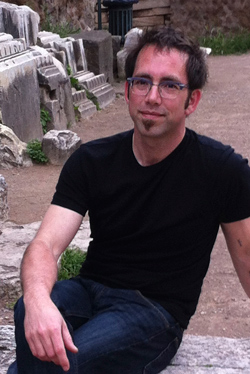Professor and author Mike Chasar writes about the evolution of poetry as it intersects with popular culture and new media, and on Dec. 14, the National Endowment for the Humanities awarded Chasar a fellowship to work on his second monograph, “Beyond the Book: Poetry and New Media in Modern America.”
From magic lantern poetry slides in the late 19th century to poetry on YouTube and elsewhere in digital formats, “Beyond the Book” will explore the evolution, impact, and future of poetry in a media-rich environment.
“‘Beyond the Book’ focuses on the relationship between poetry and non-print media, such as film, television, and the internet,” says Chasar. “By changing the way audiences access and experience poetic works, media alter our conception of what poetry is, how we can relate to it, and the many roles it plays in our lives.”
Consider, for example, what Patricia Smith’s performance adds to her print poem “Skinhead.” “The poem becomes even more meaningful and thought provoking as it’s spoken aloud and delivered via her body, on the stage, in front of an audience, and over H.B.O. on 'Def Poetry Jam,’” says Chasar.
“Or consider the difference between listening to an MP3 of Whitney Houston singing Dolly Parton’s ‘I Will Always Love You’ and watching someone sing it directly to you at a bar on karaoke night. Different media—the MP3, the human body, the karaoke machine and its lyric projector, your friend’s slightly off-tune voice and exaggerated gestures—change how you view the song,” says Chasar. “If you don’t believe it, watch Lorelai sing it in the final season of ‘The Gilmore Girls,’ at first for her daughter Rory and then, unexpectedly, for her star-crossed lover Luke. Media have profound effects on what and how poems ‘mean’ and how widely they circulate in our culture.”
As broad audiences encounter poetry in contexts off the printed page, they infuse new meaning into canonical works. “What you take away from Walt Whitman’s ‘When I Heard the Learn’d Astronomer’ as performed on ‘Breaking Bad’ differs if you’ve just binge-watched 12 hours of Netflix than if you read the printed text or listen to an audio recording of the spoken word,” says Chasar. “If we consider poetry in multimedia contexts, in addition to print, then we begin to realize just how widely popular poetry is.”
Why study the poetry of pop culture? Chasar’s research began with a question in grad school: Why are some poems published and studied in school while others go unacknowledged even though they’re important to people’s lives?
For his first book, “Everyday Reading: Poetry and Popular Culture in America,” Chasar studied 19th and 20th century poetry scrapbooks, letters, greeting cards, billboard advertisements, transcripts of poetry radio shows, and other non-canonical sources of popular poems. Because these largely unstudied works reflect people’s values, they offer insight into culture and society. They also suggest how “poetry” is a far vaster and more culturally central category of writing than people oftentimes think.
“Beyond the Book” builds on “Everyday Reading” and looks to the future of poetry as it’s shaped by — and as it shapes — American values and public life. For the term of his fellowship, Chasar will be working on Chapters Three and Four, about how film and TV have incorporated poetry and how poetry has unexpectedly affected film and TV. So the next time you’re re-watching "Orange is the New Black" or "Fight Club," keep on the lookout: you just might find a poem there as well.

